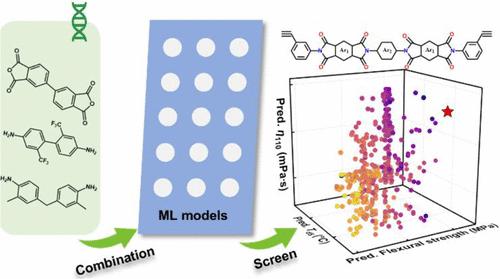当前位置:
X-MOL 学术
›
Chem. Mater.
›
论文详情
Our official English website, www.x-mol.net, welcomes your
feedback! (Note: you will need to create a separate account there.)
Discovery of Copolymer Resins with Optimal Viscosity–Toughness–Heat Resistance Trade-Offs via the Material Genome Approach
Chemistry of Materials ( IF 7.2 ) Pub Date : 2024-12-05 , DOI: 10.1021/acs.chemmater.4c02920 Xuan Jiang, Xiangfei Ye, Liangshun Zhang, Jiaping Lin
Chemistry of Materials ( IF 7.2 ) Pub Date : 2024-12-05 , DOI: 10.1021/acs.chemmater.4c02920 Xuan Jiang, Xiangfei Ye, Liangshun Zhang, Jiaping Lin

|
Accelerated discovery of polymer materials for specific applications requires the achievement of multiple, sometimes competing design objectives. Vast chemical space and the absence of well-established structure–processing–property relationships have considerably challenged the accelerated discovery of polymer materials. Herein, taking high-performance copolymer resins as an example, we propose a generalizable pipeline that integrates the screening of molecular structures, experimental validation of properties, and chemical interpretability to address both of these challenges. By means of the material genome paradigm, machine learning models are established for the structure–property relationship in conjunction with the additional viscosity for the evaluation of processing performance. Importantly, molecules of copolymer resins with low viscosity, high toughness, and high heat resistance are designed for a large search space. Experimental studies further verify that the newly designed copolymer resins possess excellent comprehensive performance, which cannot be achieved through time-consuming trial-and-error design methods. In addition, gene analysis is employed to interpret the structure–processing–property relationships of copolymer resins. The machine-learning-assisted material genome pipeline proposed in this work provides a promising strategy for the accelerated design of molecular structures in a large search space and for the understanding of structure–property relationships from data-informed perspectives.
中文翻译:

通过材料基因组方法发现具有最佳粘度-韧性-耐热性权衡的共聚物树脂
加速发现用于特定应用的聚合物材料需要实现多个设计目标,有时甚至是相互竞争的设计目标。巨大的化学空间和缺乏完善的结构-加工-性能关系极大地挑战了聚合物材料的加速发现。在此,以高性能共聚物树脂为例,我们提出了一个可推广的管道,该管道集成了分子结构的筛选、性能的实验验证和化学可解释性,以应对这两个挑战。通过材料基因组范式,为结构-性能关系建立机器学习模型,并结合附加粘度来评估加工性能。重要的是,具有低粘度、高韧性和高耐热性的共聚物树脂分子专为大搜索空间而设计。实验研究进一步验证了新设计的共聚物树脂具有优异的综合性能,这是通过耗时的试错设计方法无法实现的。此外,基因分析用于解释共聚物树脂的结构-加工-性能关系。这项工作中提出的机器学习辅助材料基因组管道为在大型搜索空间中加速设计分子结构以及从数据知情的角度理解结构-性质关系提供了一种有前途的策略。
更新日期:2024-12-05
中文翻译:

通过材料基因组方法发现具有最佳粘度-韧性-耐热性权衡的共聚物树脂
加速发现用于特定应用的聚合物材料需要实现多个设计目标,有时甚至是相互竞争的设计目标。巨大的化学空间和缺乏完善的结构-加工-性能关系极大地挑战了聚合物材料的加速发现。在此,以高性能共聚物树脂为例,我们提出了一个可推广的管道,该管道集成了分子结构的筛选、性能的实验验证和化学可解释性,以应对这两个挑战。通过材料基因组范式,为结构-性能关系建立机器学习模型,并结合附加粘度来评估加工性能。重要的是,具有低粘度、高韧性和高耐热性的共聚物树脂分子专为大搜索空间而设计。实验研究进一步验证了新设计的共聚物树脂具有优异的综合性能,这是通过耗时的试错设计方法无法实现的。此外,基因分析用于解释共聚物树脂的结构-加工-性能关系。这项工作中提出的机器学习辅助材料基因组管道为在大型搜索空间中加速设计分子结构以及从数据知情的角度理解结构-性质关系提供了一种有前途的策略。






























 京公网安备 11010802027423号
京公网安备 11010802027423号